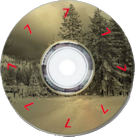| Introduction | Under The Hood |
| Difference between a CD and a DVD | Tips |
| labeling | Fix for Insufficient Space on Blank Discs |
| Drive Types | Links |
CDROM (Compact Disc Read Only Memory) or sometimes CD-ROM (Compact Disc — Read Only Memory). Computer programs come written on discs that look just like ordinary audio CDs. They can hold about 650 MB of data, or the equivalent of 433 floppy diskettes. A computer CD-ROM drive is much like one in a home stereo, except that it spins 2×, 4×, 8×, 12×, 16× or even 48× as fast. The speeds are exaggerated. They only apply to the outermost track and in burst mode. In practice drives won’t be anywhere near as fast as advertised. The faster it spins, the faster data can be read. With the appropriate cable, you can even play audio CDs (Compact Discs) on a computer CD-ROM drive. Digital CDs can be read, but not written on.
CDs and DVDs (Digital Video Discs) look almost identical. DVDs were designed to be exactly the same size so you could play old CDss on new DVD players. Blanks will have the letters CD-R, DVD-R, DVD+R, DVD-RW or Blu-Ray Disc in pale writing on the top surface to help you tell them apart. Audio usually comes on CDs. Video comes on DVDs. High definition video comes on Blu-Ray DVDs. Small programs come on CD big ones on DVD Video DVDs are often copy protected. CDs are not. You can find out what you have by letting a disc copier program such as Power2Go have a sniff. Windows is no help. It thinks everything is a CD.
The important difference you cannot see: CDs hold 650 MB (enough for 74 minutes of uncompressed audio), DVDs hold 4.7 GB (7 CDs worth) and Blue Rays hold 50 GB (77 CDs ) on a dual layer disc.
There is no practical way to brand CDs with your name, or even with a serial number. Often a magic password comes with a CD , on a piece of paper you are bound to lose. Without the password, you can’t install (or re-install) the software. Use a red Sharpie fine tip permanent marker to write the password/serial number/key on the top side of the CD where you can’t lose it. Don’t apply any sort of sticky label since it may come off inside the drive, unless it is specially designed for CDs.
The two most common kinds of CD-ROM are SATA (Serial ATA), EIDE (Extended Integrated Drive Electronics) and SCSI (Small Computer System Interface). Unfortunately there are also several other proprietary types that cause nothing but trouble often bundled with sound cards.
You would think CDs would play from the outside in, like vinyl LPs (Long Play recordings) but they start at the centre and work out. This seems odd given the outer tracks are longer than the inner. The advantage of this is it often leaves the outer tracks unused which are often smeared with fingerprints by people failing to pick up the CDs properly.
 If you are labeling a set of CDs, particularly a set of audio CDs, label them so
you can read the disc number no matter how the CD is oriented, like the CD on the
right.
If you are labeling a set of CDs, particularly a set of audio CDs, label them so
you can read the disc number no matter how the CD is oriented, like the CD on the
right.If software to write on your CD/DVD says there is insufficient space to write on every blank disc, here is how to fix it:
This page is posted |
http://mindprod.com/bgloss/cd.html | |
Optional Replicator mirror
|
J:\mindprod\bgloss\cd.html | |
 |
Please read the feedback from other visitors,
or send your own feedback about the site. Contact Roedy. Please feel free to link to this page without explicit permission. | |
| Canadian
Mind
Products
IP:[65.110.21.43] Your face IP:[216.73.216.126] |
| |
| Feedback |
You are visitor number | |